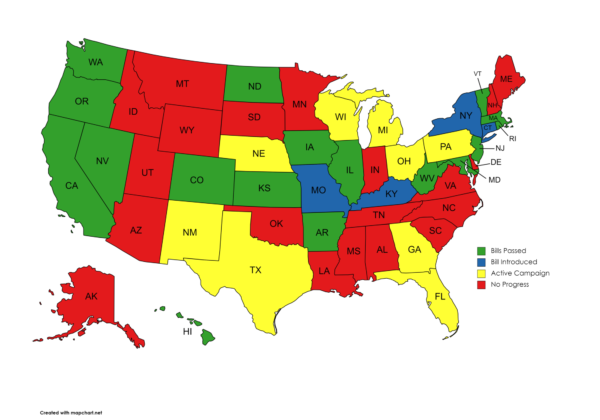Biden Isolates Europe and Asia, Ignores Reality
Recent meetings with the European Union’s Ursula von der Leyen reveal the need for Biden to separate himself from Trump’s “America First” foreign policy.

The United States would do well to look at the facts and adopt a pragmatic policy on trade and foreign affairs.
It may not seem like it, but the United States is stuck in a fatal spiral of its own creation. Groundhog’s Day may have come and gone, but President Biden never got the memo. Instead of reliving the same day over and over, though, he’s repeating the foreign policies of administrations past. Biden’s legislative prizes have become detriments to American diplomacy and economics, and it’s beyond time to initiate a reversal of course.
The Inflation Reduction Act (IRA) has resurfaced. Originally passed in August, according to Forbes Advisor, the IRA contains a multitude of provisions; the most important to foreign policy are those targeting the construction of a green economy, especially in the energy sector. CNBC reports that over $300 billion of the act’s funding goes to these provisions, especially in the form of business subsidization and investment. Especially as America seeks to wean itself off fossil fuels from rogue states like Russia and Iran, the green transition bears important strategic implications.
However, domestic subsidization is just that: domestic. As Americans watch European states struggle to drop fossil fuels in a growing energy conflict, it needs to consider the attitudes of the continent’s leaders. Especially prominent is Ursula von der Leyen, President of the European Commission (the executive body of the European Union). Von der Leyen met with President Biden in mid-March to discuss, among other subjects, a developing trade war over green energy and climate-conscious sectors. While Biden has advanced a “made in America” program, the European Union (EU) counters with its own Green Deal Industrial Plan, states RFI. Von der Leyen is asking for exemptions for European industry in line with the IRA; Biden hopes to limit the continent’s influence on America’s green development.
In a joint statement, the two leaders declared to the world that “The United States and European Union are committed to addressing the climate crisis, accelerating the global clean energy economy, and building resilient, secure, and diversified clean energy supply chains.” It continues on to say, “We are working against zero-sum competition so that our incentives maximize clean energy deployment and jobs…” Zero-sum competition, though, is exactly what Biden is pursuing; it’s a worrying trend that underlies Biden’s foreign agenda.
Biden has unapologetically chosen protectionism in a commercial setting that demands the opposite. Despite his ostentatious commitment to a rules-based international order, his government has continuously violated the same standards it requires of its allies. It’s important to note that this world order exists for a reason: primarily, to prevent the same trade war that von der Leyen has been warning about since the IRA. The second reason is to keep allies close, both financially and diplomatically. According to Bloomberg, Emmanuel Macron, President of France and a close ally, condemned the IRA as “super aggressive.” As Europe struggles to incentivize companies to stay, America is actively working against the economies of its allies by pushing for companies like Northvolt AB, a Swedish battery maker that has estimated $8 billion in American tax credits, to relocate to the U.S.
It’s simple: the U.S. can’t call for greater international cooperation in the face of massive global challenges if it refuses to cooperate itself. The hypocrisy is obvious in telling the European Union to cut its ties to consumption of fossil fuels while taking away its green energy. The same goes for urging Europe to stop its reliance on Chinese manufacturing while damaging trade ties to America. Rather than rightfully encouraging and supporting a transatlantic relationship and reinforcing unity between North America and Europe, the Biden administration has chosen foolishness.
What goes for Europe has, in the modern economy, increasingly gone for East Asia, too. It takes only a brief world history lesson to understand the modern importance of Asian industry and trade. It takes a briefer lesson on foreign affairs to understand the emerging cold war between the U.S. and China. As America looks to enhance its influence in the region and combat the spread of the People’s Republic of China, the right course of action is to expand trade relations with other states. It’s a net positive; America gains cheaper goods and security in the Pacific, Asian states experience economic growth without dependence upon an aggressive Chinese Communist Party.
That ideal contrasts with the reality of America’s asinine Asia policy. Rather than strengthen relationships in East Asia, the U.S. has directed a bevy of unfounded threats at China. Meanwhile, it is setting trade policies that will weaken America’s traditional allies in the region and drive them closer to China. The Brookings Institution reports that the states of the Associations of Southeast Asian Nations (ASEAN) have become China’s largest trading partner; at the same time, China is a dominant member of the Regional Comprehensive Economic Partnership (RCEP), which includes the members of ASEAN. The U.S. is not a member of RCEP or the Trans-Pacific Partnership (TPP), another trade-based organization that also includes some states in the Western Hemisphere.
Refusing to engage in economic diplomacy in East Asia, America has instead waged a damaging trade war against China and undermined the trade of other states with China; these policies have damaged the U.S. balance of trade by $15 billion, according to the Brookings Institution, and hurt America’s standing abroad. With Japan, China strongly finances the infrastructure of ASEAN through its Belt and Road Initiative; American investments have been minor and produced few physical results. Since the end of 2020, the EU has formed an investment agreement with China, too; the U.S. was left out.
American antipathy to involvement in East Asia can be traced to the election of Donald Trump in 2016. While negotiating the TPP, Politico states that then-President Obama claimed “if we don’t pass this agreement — if America doesn’t write those rules — then countries like China will.” He’s absolutely right. On the campaign trail, Trump argued that it was overly complex and vowed to withdraw, which he did after his inauguration to the applause of his own populist base and labor leaders. Nevermind the loss of American involvement in the Pacific commercial macroeconomy; that’s unimportant to demagoguery.
“America first” foreign policy has been boastfully daft; a study by the US-China Business Council found that the trade war with China cost 245,000 jobs while claiming to bring jobs back. Jobs weren’t the only thing lost; the Carnegie Endowment for International Peace states that the trade deficit with China and the rest of the world rose in correlation with the tariffs. Trump’s irate, irrational, and unpredictable personal treatment of global leaders distanced himself and the U.S. from its allies around the world, according to Euronews.
One would have hoped that the 2020 election could change the trajectory Trump set. That assumption was wrong. Biden has barely changed course on expanding European authoritarianism; he’s performed idle snubs of Hungary’s Victor Orbán, states Newsweek, and in Poland, Politico names few criticisms by Biden of the country’s illiberal government. The outlet’s explanation: “war makes for strange bedfellows.” Toward Europe, as stated prior, Biden has proved unbelievably aggressive. At the same time, the Associated Press reports that Biden refuses to work towards rejoining the TPP and has instead promoted an Indo-Pacific Economic Framework (IPEF) that does extraordinarily little; Global Times derides the deal as a useless arrangement that does little to roll back American protectionism or encourage regional cooperation. Meanwhile, the CHIPS and Science Act, which Biden pushed hard through Congress, damages Taiwanese, South Korean, and Japanese economies, says Al Jazeera, at a time when such damage could be critical in ongoing security concerns. At the same time, the IRA that von der Leyen hopes to weaken is also hurting the technology sectors of these East Asian states.
America was promised change from the derision and folly of Trumpism in 2020. Apparently, the country bought a protectionist nightmare instead of a liberal dream. While gearing towards a populist 2024 campaign, Biden has continuously isolated allies in Europe, prospective friends in Asia, and the global community as a whole. Contemporary history demonstrates that it isn’t a smart move for America or international security; the goals it hopes to achieve, namely domestic manufacturing growth and a green industrial transition, are hopeless if the U.S. is unwilling to enjoy the friendship it has cultivated.
It’s long past time to retire “America first” foreign policy. It didn’t work for Trump and it’s not working for Biden. If he doesn’t heed the warnings of his friends and step away from the precipice of serious geopolitical dangers, the President risks a lonely 21st century for the U.S. It’s valuable to pursue domestic growth, but the costs are extreme and the benefits few. Finding policy solutions that address the concerns of the American economy while paying attention to global conflict and diplomatic obligations is the only prudent answer.







